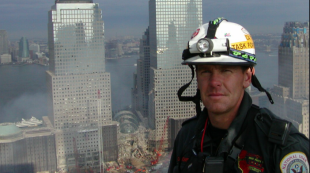Harold Schapelhouman, fire chief at Menlo Park Fire Protection District, is breathing heavily.
The posted speed limit is 15 mph, but when you're fighting respiratory infection by way of mountain biking, rules go out the window. Your lungs need it. You have to push it.
Schapelhouman has been pushing it for years.
As the former captain and task force leader for California Urban Search and Rescue, Schapelhouman has responded to disasters all over the country. He's seen what both man and Mother Nature can do, from the Oklahoma City bombing to Hurricane Katrina.
He knew what he would see when his team headed to New York to assist in the cleanup and recovery efforts after the attack on the World Trade Center in 2001.
"It's like working in a graveyard. But somebody has to do it. Somebody has to go in there and pick up the pieces. … We're an elite team, and we were honored to go," he says.
What he did not anticipate is the long-term impact of his time on "the pile," at the World Trade Center.
Schapelhouman and his team members are only some of the thousands of first responders who have shown signs of debilitating illnesses from breathing the dust at the site.
Seventy percent of his team got sick from their time spent at Ground Zero. Some of their symptoms include bloody noses, skin rashes, pneumonia, upper respiratory infections, and what is known as the WTC Cough.
Schapelhouman often wakes up in the middle of the night unable to breathe. "It reminded me of going out on a call for an 80-year-old emphysema patient who'd smoked all his life. This can't be happening to me. I'm too young for this to happen. I'm in the best years of my life. I'm in my 40s; I'm at the top of my game."
Schapelhouman is not only an advocate but also one of thousands of workers and residents from the Ground Zero area enrolled in the World Trade Center Health Registry. The registry was created to monitor the health effects of people involved in the recovery, or those who lived near the towers. It is the largest registry to track the health effects of a disaster in American history.
Late last year, Congress passed the James Zadroga 9/11 Health and Compensation Act, which provides financial aid to sick workers. Joe Daniels, president of the National September 11 Memorial & Museum, says that although it took time to get the bill passed, it was the right thing to do. "The people that worked here on the pile, the construction workers, the volunteers, the trades, the first responders, they did it selflessly. They did it without thinking anything other than 'We need to come here, we have the skills to help out, we want to help out.'"
Schapelhouman says this attitude is echoed by almost all of the personnel that helped with the recovery.
[ Photos: Mural artists remember 9/11 ]
"It's a very conflicting thing. You wish it didn't happen, but if it's going to happen, I know most firefighters or even police officers would say, 'I want to be there.' Because that's what we do. That's our job.'"
Schapelhouman has taken up a strenuous exercise regimen to combat his respiratory illness. It's not a choice. He knows if he doesn't exercise hard, he won't live the life he would have lived had he not gone to Ground Zero.
Once again, he's pushing it. Not just for himself, but for his family.
Schapelhouman wants a normal life. He wants to see his 11-year-old daughter grow up and get married. He wants to live long enough to play with his grandchildren.
He also doesn't want to forget Ground Zero, although part of him has to.
"You can't help but come back from one of these events and feel as if, when the sun's out, the day is a little bit brighter. When you're with the family and your friends, it's sweeter and it gets better...It's realizing how fragile life is."
Video produced by Brad Williams and Ricky Montalvo. Shot and edited by Brad Williams. Post-Production Audio by James Kelly. Graphics by Howard Kim for Yahoo! Studios.
Share your 9/11 memories with us on Twitter - #911remembered



